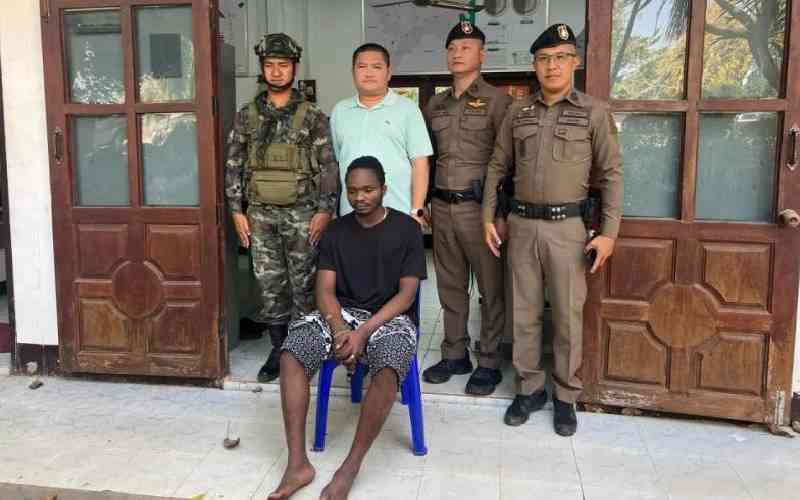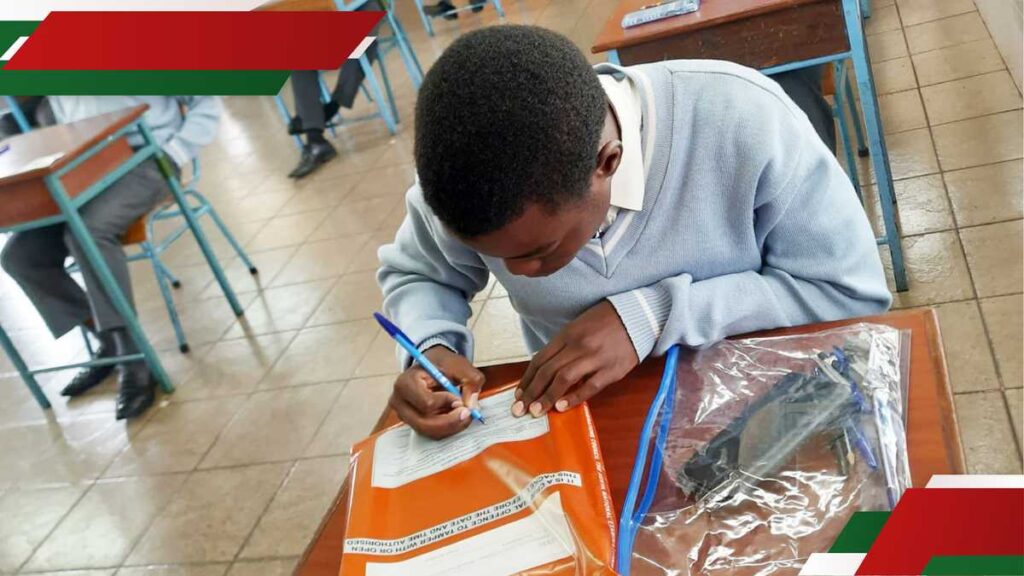Landing in Bangkok on October 3, 2024, was a dream come true for 30-year-old James Amunga, a moment to savour and cherish.
The nine-hour flight from Jomo Kenyatta International Airport (JKIA) to the Thai capital felt like a lifetime. It was long, exhausting, and seemingly unending, yet beneath the fatigue, a sense of excitement pulsed within him. After all, his life was about to change forever.
It was the first time Amunga had ever taken such a long journey, but he believed it was worth every minute.
“Things were not working back home. I needed this. I wanted to escape poverty. I needed a well-paying job, and here was my chance—finally!” Amunga confided to The Standard in an interview in Nairobi, weeks after he escaped the jaws of death in Myanmar, where he had been recruited as an online scammer by a ruthless global network of Chinese traffickers.
He had been tricked into believing he would secure a job as a chef at one of Bangkok’s prestigious hotels.
For four months, Amunga endured unimaginable horror. He was forced to master the complex art of online scamming, coerced into conning millions of dollars from unsuspecting victims across the globe.
Defiance was never an option and any hint of uncooperativeness was met with brutal consequences that could range from electric shocks, severe beatings, and days of isolation in dark, airless rooms.
He is not alone. Dozens of Kenyans, along with other nationalities, are trapped in the same nightmare—enticed by promises of lucrative jobs in neighbouring Thailand, only to find themselves enslaved in Myanmar under vicious Chinese cartels running scam centres.
On March 22, 2025, 48 Kenyans tricked with promises of jobs in Thailand, arrived at JKIA after being rescued from Myanmar. Many were frail, weak, and in deteriorating health.
Upon their arrival they were given stern warnings by Kenyan state operatives not to speak to the media. Many who we contacted were willing to share their stories but feared reprisals.
The Standard’s Investigations Unit, however, can now reveal that, to date, not a single recruitment agency involved in sending the 48 to Myanmar has been interrogated or even shut down, this, despite exposing young Kenyans to the jaws of death.
When contacted, the Ministries of Foreign Affairs and Internal Security declined to comment on any ongoing investigations.
The Directorate of Criminal Investigations promised to contact us with more information but did not provide any further details after that.
Our investigations, however, can now reveal some of the key figures behind this deadly racket that is endangering the lives of young Kenyans.
Stay informed. Subscribe to our newsletter
The ringleaders
Grace Eshiwani, described as a well-connected agent and a woman of means, is reportedly a ringleader with direct contact with the cartels. She is responsible for arranging the airlifting of most Kenyan victims to Myanmar.
Almost every victim we spoke to identified her as the key conduit linking Kenyan recruits to the Chinese cartels in exchange for a hefty payoff.
She is said to receive between Sh150,000 and Sh200,000 from each recruit, in addition to thousands of dollars from the cartels. She claims to run various offices in Nairobi and Dubai.
She is both feared and revered.
“She is a sweet talker. When you speak to her, she claims to be in Bangkok, but when you arrive, she tells you to find her at the job centres. We know DCI officers are aware of her operations, but she remains untouchable,” said Gideon (not his real name), a victim who confided in us.
Jane Thiong’o, another local agent, runs Unique Global Genuine Agencies on Moi Avenue, Bazaar Plaza, 8th floor, Room 847. She, too, has been named as a conduit for the cartels.
“I confronted Jane when I came back. I asked her, ‘Why did you sell my soul to the devil?’ She played dumb and claimed she had no idea what was happening to us,” said Joakim (not his real name), another victim who requested anonymity.
Victims also named another operator called John Njuguna, who runs an office on the second floor of Uniafric building along Koinange Street.
Mobile money transactions seen by The Standard implicated all the key players.
Amunga’s nightmare
For Amunga, in an act of sheer courage and desperation, he made it back home. He arrived back in Kenya on February 22, 2025, battered and scarred. Scars that have refused to fade away to date.
The story of Amunga starts from the dusty slums of Kivumbini in Nakuru County, where he was born and brought up.
Life in the informal settlement was never easy; it was tough and demanding.
“If you’ve been to Kivumbini you’d understand why I was really keen to escape life over there, fending for my family became a tough call, I needed a way out,” said Amunga.
Amunga, a trained chef from Nakuru, was one of the many young people recruited by a local travel agency that promised him a coveted position as a chef at one of Bangkok’s most prestigious hotels. The job came with a salary promise of $1,500 per month (about Sh194,000), a fortune for a man struggling to support his young family.
To secure the opportunity, the agency demanded Sh200,000 up front. Desperate to change his family’s fortunes, Amunga borrowed from friends and did everything possible to raise the fee.
And so, when he finally touched down in Bangkok, his heart swelled with joy. Overcome with emotion, he placed his bags on the airport’s sidewalk, kissed the ground, and whispered a prayer of gratitude.
This was it, a golden opportunity to transform the lives of his wife and two children. At last, they would have the decent life he had always dreamed of.
But the dream was about to unravel into something else- a nightmare.
“When we landed in Bangkok, it felt so pleasant, so relieving,” he stated.
“But soon, things started to feel somewhat off,” Amunga recalls.
Trafficked
At the airport’s exit, Amunga and two other Kenyans were met by a woman holding a placard with their names. While other passengers proceeded through normal security checks, the trio was ushered aside by a waiting police officer. He picked up their bags and led them to a sleek Toyota TX parked nearby.
Hmm… this felt a bit too luxurious, Amunga thought. “But I told myself maybe this was just how prestigious hotels treated their new hires,” he consoled himself.
And true to their instincts, it wasn’t long before their hopes started to crumble.
“We drove out of the airport, but something wasn’t right. We weren’t heading into Bangkok. We were driving in the opposite direction. What was meant to be a short trip turned into hours of driving.”
Reality started to hit hard. By the time the vehicle came to a stop, it was clear, they weren’t in Thailand anymore but in neighbouring Myanmar.
They had been trafficked.
“We were led into a heavily guarded compound, somewhat a city-like environment surrounded by towering walls and patrolled by men in military gear. No one said a word. The driver handed us over to these men,” he recalls.
For the next four months, Amunga was trapped in a hellish existence, forced to scam people online while under constant threat of violence.
At this stage, escape seemed impossible while defiance meant torture. This wasn’t a job any more but clear modern-day slavery.
Myanmar, a country of about 50 million people, sits in Southeast Asia and borders Thailand to the west.
The Asian country has become a global hub for online scam operations largely buoyed up by its weak governance structures and ongoing political turmoil.
Since the country’s military seized power in 2021 through a coup, law enforcement has crumbled in parts of the country, particularly in the lawless border regions controlled by armed militias and criminal groups.
These areas, usually beyond the reach of Myanmar’s central government, have become safe havens for human trafficking rings and large-scale scam operations.
Seemingly, the trade has flourished either because local authorities have turned a blind eye or lack the power to intervene.
Foreign nationals, especially from developing countries like Kenya, increasingly remain prime targets for recruitment. The driving force being the promise of high-paying jobs, making them easy prey for traffickers who capitalise on their economic desperation. Once trapped, victims are subjected to forced labour, made to work under extreme duress, carrying out online scams that target individuals globally.
Albert, not his real name, was another victim rescued from a scamming centre in Myawaddy, a town in southeastern Myanmar near the Thailand border.
Days after arriving home in Kenya from the troubled nation, the 28-year-old former taxi driver says his mind is still troubled.
“Sometimes I wake up at night screaming. I am constantly fighting shadows at night. I don’t know how I will ever overcome these nagging, scary thoughts,” says Albert.
Just like Amunga, he parted with Sh200,000 to a local agent after the promise of a better life was dangled before him.
“I was employed as an Uber driver, making between Sh500 to Sh1,000 a day. This could not sustain my life, so when I was told I would earn over Sh200,000 per month, I couldn’t think twice,” observes Albert.
“The day I touched down at JKIA from this slavery, I felt like I was born again,” he exclaims. “I am yet to find another opportunity, but I’d rather die here at home than anywhere else.”
No arrests
He has since contacted his local agent, who is still operating, but they have declined to refund his money.
Martin, not his real name, from Kilgoris was also among the latest group of victims rescued from Myanmar. He had abandoned his boutique business in pursuit of a better life abroad.
“I feel terrible. I feel used, and I’m not sure I will ever heal from this. I was turned into a scammer. All my life, I had never stolen from anyone, but I was forced to. I stole over Sh10 million from innocent people while I was there,” said Martin.
His voice trembles as he recounts the harrowing experiences. “I cry every day when I remember that at one point the ruthless gangs forced me to work even when I was sick and on a drip. I would type with one hand, and they did not care. All that mattered to them was using us to make money, such heartless human beings!” he said bitterly.
“I’d like to warn Kenyans not to consider any job in that part of the world. You are better off dying at home than being tortured to death. Our government needs to truly take action against those involved in this syndicate. It’s evil that no one we know has been arrested, even days after we returned,” Martin lamented.
For Amunga, who says he has now taken up an active campaign to raise awareness about the woes in Myanmar, sneaking a phone into the scam centres saved his life and many others.

























